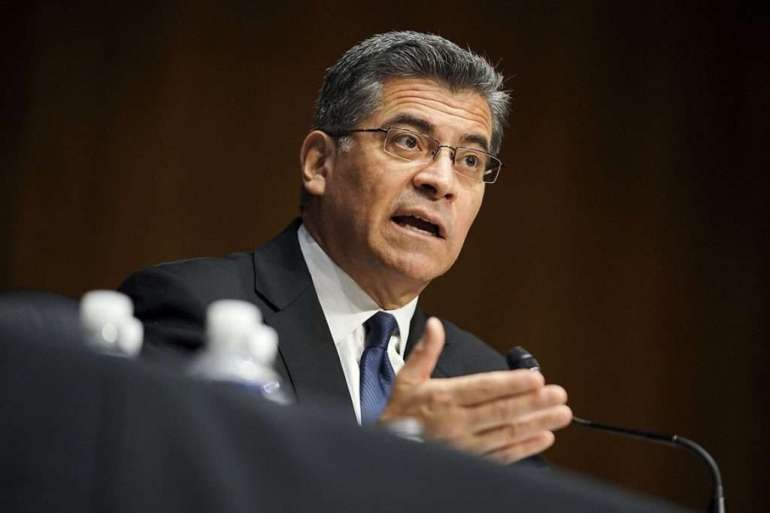4 takeaways from Xavier Becerra’s confirmation hearings

Republican and Democratic senators grilled Becerra on Tuesday and Wednesday on how the Biden administration will work to bring down the cost of insurance coverage, prescription drugs, and medical tests and procedures. Though he offered few specifics, the questioning signaled a major shift from past battles over how to get more people insured.
Becerra demurred when Sen. Chuck Grassley (R-Iowa) asked him whether he preferred a bipartisan Senate drug pricing bill from the previous Congress that would penalize drugmakers that increase prices higher than inflation or a more progressive approach that would involve the government directly negotiating the cost of certain drugs.
But Becerra in other exchanges with senators suggested that his cost-cutting efforts could include a continuation of some Trump administration policies, including rules requiring hospitals to disclose the prices they negotiate with insurers, and efforts to lower the price of insulin.
Becerra also touted his work as California attorney general on pushing for transparency on the cost of procedures and prosecuting anti-competitive practices by some hospital chains, saying they could be replicated at the national level to lower costs for consumers.
But several lawmakers signaled that any sweeping changes will be difficult to pass through a narrowly divided Congress. Republicans, including Senate health committee ranking member Richard Burr (R-N.C.), criticized Becerra’s past support for using so-called “march-in rights” to effectively ignore pharmaceutical company patent exclusivity in order to get competing versions of a drug to market, warning it would have a “chilling effect” on the development of new treatments.
The conversation largely revolved around remdesivir, one of the few treatments effective against Covid-19, which was developed with government funding. But it showed Republicans’ willingness to come to drugmakers’ defense and oppose government intervention at a time when drug pricing reform could be a bipartisan cause.
‘Medicare for All’ has replaced Obamacare as the GOP’s boogeyman
Over the two days of hearings, Democrats were eager to tout Becerra’s work in the House of Representatives helping draft the Affordable Care Act and his actions as attorney general to defend it in court. Republicans, however, largely avoided mentioning the law.
Instead, they focused on Becerra’s past calls to move toward a Medicare for All system that would replace private insurance, characterizing him as “radical” for supporting a single-payer system. Finance ranking member Mike Crapo (R-Idaho) demanded Becerra promise not to pursue a “federal takeover of health care.” Becerra responded that if confirmed, he would stick to the policies Biden ran and won on, including shoring up and expanding the ACA.
“I appreciate hearing that,” Crapo responded.
Becerra declined to endorse specific ways to expand coverage, making clear he’s following Biden, who wants no part of Medicare for All. Even Sen. Bernie Sanders (I-Vt.), who championed single-payer insurance and made it the centerpiece of two presidential bids, didn’t press him on that at the Senate HELP Committee hearing.
The battle over school reopenings will loom large
Nowhere has Biden’s campaign trail pledge to “listen to the scientists” created more political challenges than the thorny issue of reopening schools during the pandemic — a question Becerra steered around during the hearings but would have to confront head on if confirmed.
Sen. Susan Collins (R-Maine) on Tuesday cited a study saying children only need three feet of spacing rather than six, which the Centers for Disease Control and Prevention currently recommends, adding the administration should do a better job of balancing the health risks of reopening with the emotional and educational risks of keeping kids connected virtually.
Becerra responded that the Biden administration will defer to local officials on when and how to reopen schools and indicated that he views the threat of Covid as more serious than the fallout from continued distance learning.
“No one wants a child to become the reason an adult becomes ill from Covid,” he said.
Abortion foes are playing defense
Even as red states continue to press sweeping new abortion plans, the hearings made clear that conservatives are pivoting at the federal level, with a new focus on blocking the Biden administration from lifting restrictions on abortion medication and restoring federal family planning funding to Planned Parenthood — steps it would likely take with or without Becerra.
Ahead of the hearing, the country’s leading anti-abortion groups mobilized for a long-shot campaign to defeat Becerra, pouring millions into ads and call-in campaigns to pressure swing state senators — including those up for reelection next year — to vote down his nomination.
Sen. Ben Sasse (R-Neb.) was one of several Republicans to elevate the same message during the the hearings, and on Wednesday engaged in a heated exchange about Becerra’s lawsuit to enforce Obamacare’s contraception mandate, accusing him of “bullying” an order of nuns that sought an exemption. Becerra struggled to respond.
But there’s little evidence, so far, that the campaign is swaying any Democrats.
Bob Casey (D-Pa.), one of the few Democrats to support abortion restrictions, put out a statement after Wednesday’s hearing calling Becerra “the kind of leader our nation needs.”
Before the hearing, Senate Finance Chair Ron Wyden (D-Ore.) told reporters that he’s not aware of a single member of his caucus who has raised concerns about Becerra and characterized the campaign against him as “flailing.”